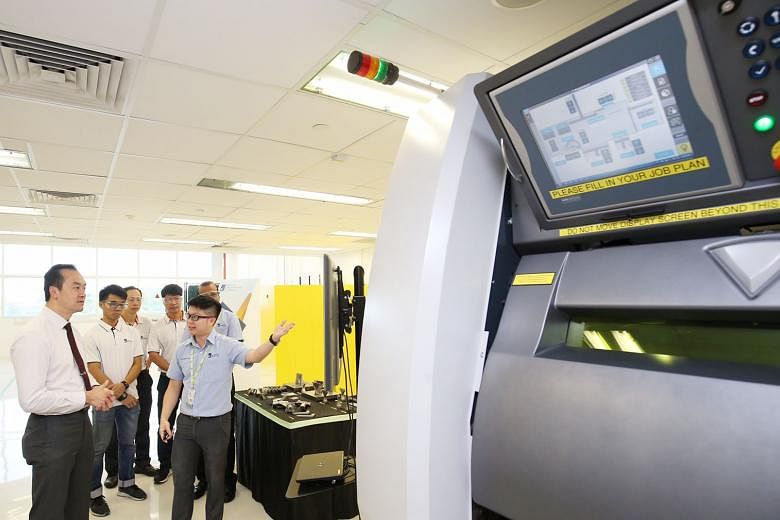Smaller manufacturing players who want to try the latest hardware without breaking the bank can take advantage of a new sharing scheme set up by the Agency for Science, Technology and Research (A*Star).
The Tech Access Initiative, which was announced in February's Budget, was unveiled at A*Star's new Industrial Additive Manufacturing Facility yesterday.
Companies will be able to use 19 different types of equipment at the facility, including robotised 3D scanners and high-pressure cold sprays, to carry out projects and train workers. They may even be able to acquire machines to scale up operations and expand once technical capabilities have been built up.
The new scheme will help local small and medium-sized enterprises (SMEs) keep up with the competition as manufacturing goes high-end, said Senior Minister of State for Trade and Industry and National Development Koh Poh Koon.
"With Tech Access, we are stepping up our efforts to help SMEs to innovate and to adopt advanced manufacturing technologies, enabling all of you to actually transform operations," he said at the launch.
Advanced additive manufacturing is the name of the game at A*Star's new 6,100 sq ft facility in the Jalan Bahar area. It refers to the process of making objects by depositing materials in successive layers - for example, with 3D printing.
-
19
Number of types of equipment companies will be able to use at the facility.
The technology has allowed the aerospace and offshore and marine sectors, among others, to build complex metal parts.
"To remain competitive in the changing manufacturing landscape, our SMEs need to deepen their innovation capabilities and tap the opportunities from advanced manufacturing technologies," said Dr Koh. He said additive manufacturing is one of the technologies that is key to the Government's advanced manufacturing and engineering strategy, under the $3.2 billion Research, Innovation and Enterprise 2020 master plan.
One small manufacturer keen on the initiative is Forefront Additive Manufacturing, which opened its doors in Tampines in May. Managing director Wu Yong Lin spent an hour or so peppering A*Star staff with technical questions while they toured the facility.
Mr Wu was assessing which machines could complement the three worth around $2 million in his factory. His company now "pays a premium" when buying powder for supplies, but some equipment available under the Tech Access Initiative will let it cut costs by producing its own. "I think there are many opportunities for collaboration," he told The Straits Times.
A*Star is partnering the Singapore Precision Engineering and Technology Association (Speta) and the Singapore Manufacturing Federation to promote the programme within the manufacturing sector.
Speta executive director Steven Koh said in a statement that the initiative means "A*Star's high-tech equipment, technologies and facilities will now be more accessible to our members so they can improve their manufacturing processes".
His trade association has more than 200 members, with about nine in 10 being SMEs.


